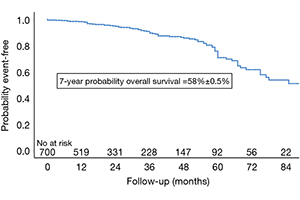Outcome of rapid deployment aortic valves: long-term experience after 700 implants
Abstract
Background: The Edwards Intuity Valve System is a bioprosthesis with a balloon-expandable stent frame which enables rapid-deployment (RD). We aimed to analyze our single-center long-term experience with a follow-up until 9 years after aortic valve replacement (AVR) with this bioprosthesis.
Methods: Between May 2010 and May 2019, 700 consecutive patients with severe aortic stenosis or combined aortic valve disease, implanted with a RD valve at our institution, were included in a prospective database. Median follow-up was 19 months and the total accumulated follow-up was 2,140 patient-years. Pre-operative characteristics, operative parameters, survival rates, valve-related adverse events and valve hemodynamics were assessed.
Results: Mean age was 74±8 years, 45% female. Concomitant procedures were performed in 339 (48.4%) patients. In case of isolated AVR (361/700), a minimally invasive surgical (MIS) approach was conducted in 283 patients (78.4%). Cardio-pulmonary bypass (CPB) and cross-clamp times for isolated AVR were 107.7±28.2 and 73.8±21.3 minutes for MIS approaches and 92.8±28.8 and 57.5±20.6 minutes for full sternotomy (P<0.001), respectively. Mean gradients at discharge, 1, 3 and 5 years were 13±5, 11±4, 12±5 and 13±8 mmHg. New early pacemaker implantation was required in 8.9% of patients. Re-intervention or re-operation with valve explantation for structural degeneration, non-structural dysfunction or endocarditis, occurred in 21 cases (3%). Thirty-day mortality was 0.7% (5/700) and overall survival at 1, 3 and 5 years was 98%, 91% and 76%.
Conclusions: We report excellent long-term results in this updated single center experience for RD aortic valves regaring durability, safety and hemodynamic performance.
Cover






